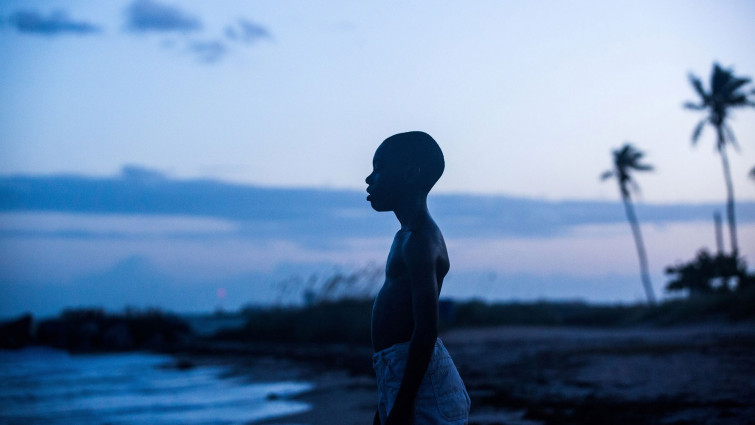

Member review

Moonlight
Coming-of-age drama focusing on a young black man growing up in a poverty-stricken Miami neighbourhood where he struggles to fit in.
Certificate
Duration111 mins
Review by
-
 Drishya, 16
Drishya, 16 - 6 reviews
A grand sonata of hardship, hope and heart
As of when I’m writing this, the date is 21st October 2019, marking three years since cinema has witnessed the release of one the most monumental films to ever grace our decade. You might be able to guess that I love this movie. I only just watched it yesterday. I’m planning on watching it again tonight.
Moonlight is a visionary narrative directed by Barry Jenkins, following the coming-of-age of Chiron, a young, African American boy growing up in the destitute limbs of Miami. Within the anatomy of three chapters and identities given to our protagonist, i.) Little, ii.) Chiron and iii.) Black, the audience beholds a visceral story embroiled in hardship, confusion and intimacy.
The first chapter is entitled ‘Little’, referring to a degrading nickname that young Chiron (Alex R. Hibbert) is bestowed, presumably by his bullies, and centres around his childhood. In the story’s first fragment, we are introduced to Juan (Mahershala Ali), a drug-dealer with a heart, who offers Chiron, having just been chased by his persistent bullies, a place of shelter.
From there we meet Juan’s partner, Teresa (Janelle Monáe), and come to realise that there is no biological father to be seen in neither the foreground nor the background of the story, simply Chiron and his mother, Paula (Naomie Harris). Their relationship is central to the plot and one that you could categorise as “love-hate”, with Chiron’s mother being addicted to and very much controlled by the grasp of cocaine. With Chiron lacking one, Ali’s character slips into the role of being a father-figure, this being evident in the swimming lesson scene, wherein the seawater baptises Chiron and symbolises his first true sharing of vulnerability with another male. This scene is one of the highlights of the film, with its pervading and almost tangible intimacy.
The secondary years of “Chiron” brings us the catalyst that is his adolescence.
Now as a teenager, Chiron (Ashton Sanders) juggles facing harassment from ever-persistent bullies and coping with a turbulent Paula. The omnipresence of water is used once again to symbolise masculine vulnerability in a scene between Chiron and his closest friend Kevin (Jharrel Jerome), wherein they both experience a profound sexual awakening. What follows after however, shatters their connection and results in the pair’s separation. A silent scream of yearning and remorse shrouds the ending of this second chapter.
“Black” is the final fragment of the story, and dare I say, my personal favourite.
Here we get to see his adulthood and it’s safe to say that Chiron’s (Trevante Rhodes) physical transformation from boy to man, is nothing less than jaw dropping. Long gone is the skinny, unimposing boy we grew to know in the first two chapters.
Now, Chiron has become a towering presence, armoured with his gold chains, grill and expanding hunks of muscle – he has become the alpha male of his very dreams. Yet, as everyone asks him throughout the film, “Who is you, Chiron?”, it’s not difficult to see that underneath his layers of “masculinity” and ironclad appearance, lies the earnest Chiron who sheds tears so much that he’s afraid he’ll “turn into drops”. Time and time again, there is the conflict of false, or rather, confused identities, as a result of adversity. .
Technically, the vignette of Moonlight is magnificent.
James Laxton’s cinematography is a feast for the eyes, with his saturated shots of Miami and opalescent takes of dark skin. The colours throughout the film are iridescent, ranging from beiges and creams of the neighbourhoods to deep pinks you can gaze upon.
Nicholas Britell’s soundtrack is similarly haunting, with symphonic crescendos and striking piano and violin pieces that heighten Chiron’s thoughts and feelings. Ultimately though, the acting is the roaring crux of Moonlight; all performances are a wonder to spectate upon as the authenticity is incomparable and particularly in the last act, it is the little nuances that solidify the characters and their bonds.
Moonlight is masterfully executed, covering a story that encompasses hardship and suffering, yet showing that there is still beauty to be found within it. Very few films achieve what it has done – become alive.
And I say that because Moonlight is truly a film, breathing and pulsating in the flesh.
It has a mind and body of its own, a heart of its own that beats endlessly and a hand of its own, that dares to reach out and touch you with its tender caress. The ending is suggestive and piercing but parts you with a message of hope, as young Chiron looks back at the audience, ocean rushing in the background, beckoning you.